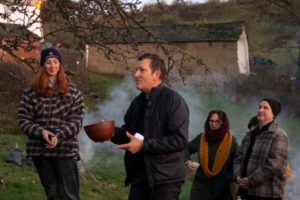Here’s to Thee is a joint commission between University of Exeter Arts and Culture and RAMM, led by internationally renowned artist Simon Pope.
This thought-provoking new collaboration is uncovering the complex ecology and cultures that surround the art of cider making. Cider-farms are rich and complex ecologies. Through them people, other species, and natural and synthetic elements come into contact with each other. The production what we know as ‘farmhouse cider’, involves many elements. Plastic vats, oak barrels, submersible pumps, a range of apple tree species, lichens, farm animals and agricultural policy, are all part of the process.

Wassailing
Wassailing is the ancient custom of visiting apple orchards in mid-Winter to carry out certain rituals, which are meant to ensure a good apple-harvest later in the year. Rituals include walking from tree to tree, singing a wassail song and reciting an incantation alongside, drinking mulled cider from a communal wassail bowl.
Pope, is originally from Devon and now works between here and Toronto, Canada. His latest video-diary is a meditation on the ethical and political problems of wassailing on Traditional territory of First Nations in Canada. The seemingly straightforward celebration of apple trees, soon becomes troubled by the role played by Malus domestica (apples):
“At its best, wassailing coincides with a renewed interest in both individual and community relations with the natural world.” Pope states it can be seen, “as a response to rapid climate change, and a recognition of the damage done by humans to other species and the planet more generally.”
However, this benign British folk tradition works differently when performed in Ontario:
‘To celebrate the orchard-apple tree on Traditional territory is to risk overlooking the ways in which the planting of fruit trees is intrinsic to the colonial process. This formed part of the systematic process of colonization, along with suppression of Indigenous languages, traditional knowledge, and removing children from their families and kin. To celebrate Malus domestica as a species is to remind Indigenous people of this.’
A programme of public events and displays will invite audiences to discover more about the rich world of microbiomes to better understand how we are all connected with our environment.
This content is viewable by members only. Login or sign up to get access.

